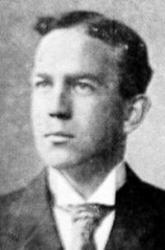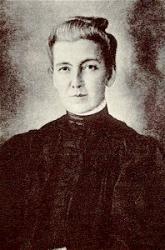Planning worship?
Check out our sister site, ZeteoSearch.org,
for 20+ additional resources related to your search.
- |
User Links
Person Results
‹ Return to hymnal



Export as CSV
William Edie Marks

1872 - 1954 Hymnal Number: d22 Author of "He surely means me" in Hallelujah Songs
Born: July 1872, Delaware (probably Wilmington)
Died: November 20, 1954, Wilmington, Delaware.
Buried: Lombardy Cemetery, Wilmington, Delaware.
Marks was apparently living in Wilmington, Delaware, in 1913. His works include:
Cream of Song, with Leander Pickett & O. B. Culpepper & (Louisville, Kentucky: Pickett Publishing Company, 1906)
Tears and Triumphs No. 4, with Leander Pickett & Benjamin Butts (Louisville, Kentucky: Pentecostal Publishing Company, 1910)
Noted Hymns, 1927 (editor)
Lyrics--
Christmas Joy
Tasting the Joys
Trying to Be More like Jesus
We Shall Hear Him Say, "Well Done"
Music--
Best Thing I Ever Did, The
End Is Not Yet, The
I Am Going to Continue
In the Morning We Shall See
It Is Mine
Jesus Satisfies
Jesus Took the Burden Off
Keep Telling It
Last Mile of the Way, The
Let Jesus Remove It Today
Lift Thy Face to the Light!
Rapture Indeed!
Tell It Wherever You Go
When We Use Our Talents
You Ought to Know Him
http://www.hymntime.com/tch/bio/m/a/r/k/marks_we.htm
William Edie Marks
J. E. Thomas
1860 - 1946 Person Name: J. Edmond Thomas Hymnal Number: d77 Author of "Hallelujah, we shall rise" in Hallelujah Songs J. Edmond Thomas Born: December 6, 1860, Calhoun County, Arkansas. Died: April 30, 1946, Fort Worth, Texas. Buried: Greenwood Cemetery, Fort Worth, Texas. Note: Some sources give his first name as John; his tombstone says James. Thomas was the husband of Courtney Lee Wigley and Pearl Hatchett (married 1923) In 1874, his family moved from their farm in Texas to Arkansas. His father died later that year.
As the oldest son, he had his hands full supporting the family, but he managed to begin attending a vocal school at age 17, under Professor T. A. Bridges. He later studied under Horatio Palmer and George A. Goodrich.
He began a full time music career in 1890, and with Franklin Eiland and John M. Greer, and helped found the Trio Music Company in Waco, Texas, in 1892. He went on to establish the Quartet Music Company in Fort Worth, Texas.
A teacher, composer, music compiler, and publisher for over 44 years.
© The Cyber Hymnal™ (www.hymntime.com/tch)
J. E. Thomas
Bernard Barton

1784 - 1849 Hymnal Number: d160 Author of "Walk in the light, so shalt thou [and you shall] know" in Hallelujah Songs Barton, Bernard, commonly known as the "Quaker Poet," was born in London Jan. 31, 1784, and educated at a Quaker school at Ipswich. In 1798 he was apprenticed to Mr. S. Jesup, a shopkeeper at Halstead, Essex, with whom he remained until 1806, when he removed to Woodbridge, Suffolk, and entered into business with his brother, as a coal and corn merchant. On the death of his wife at the end of the first year of their married life, he proceeded to Liverpool, where he acted as a private tutor for a short time. He returned to Woodbridge in 1810, where he secured an engagement in the local bank of the Messrs. Alexander. This appointment he held for 40 years. He died at Woodbridge, Feb. 19, 1849. During the same year his daughter published his Poems and Letters, with a Memoir. His poetical works were numerous, including:—
(1) Metrical Effusions , 1812; (2) Poems by an Amateur, 1818; (3) Poems , 1820; (4) Napoleon, and other Poems, 1822; (5) Poetic Vigils, 1824; (6) Devotional Verses founded on Select Texts of Scripture, 1826; (7) A Widow's Tale, 1S27; (8) New Year's Eve, 1829; (9) The Reliquary, 1836; (10) Household Verses, 1845. A complete list of his works is given in Joseph Smith's Descriptive Catalogue of Friends' Books, Lond., J. Smith, 1867, vol. i. pp. 196-200.
From these works about 20 pieces have come into common use as hymns. These are found principally in the Scottish Evangelical Union Hymnal, on the one hand, and various American Unitarian collections on the other. The best known are, “Lamp of our feet, whereby we trace," and "Walk in the light, so shalt thou know." From his Devotional Poems, &c, 1826, the following have passed into the Scottish Evangelical Union Hymnal, 1878:—
1. Fear not, Zion's sons and daughters. Gracious Promises. This is part of a poem on Isaiah xliii. 1, “Fear not, Jacob, tabulated."
2. Hath the invitation ended? Invitation.
3. See we not beyond the portal? Present vision Imperfect. This is part of the poem on 1 Cor. xiii. 12, “Dim and dark our present vision."
4. Those who live in love shall know. Peace.
5. Would'st thou share this benediction! Poor in Spirit.
In addition, there are also in various collections:—
6. Around Bethesda's healing wave. Consolation. This is on pp. 182-185, in his Napoleon, and other Poems, 1822, in 10 stanzas of 6 lines. A cento therefrom is given in a few American hymnals, including Mr. Beecher's Plymouth Collection, No. 746, as, "The waters of Bethesda's pool."
7. There is a life more dear. Spiritual Life. From the Devotional Verses, 1826, p. 96, into Kennedy, 1863, No. 1177, with the omission of stanza v.
8. Say not the law divine. Spiritual Law. Also from the Devotional Verses, 1826, p. 34, into various American hymnals, generally Unitarian, as the Hymn and Tune Book, Boston, 1868, No. 342, &c, where, however, it is rewritten from an irregular metre to S.M. This had previously appeared in Hedge and Huntington's Hymns for the Church of Christ, Boston, U.S., 1853.
Other hymns, given in great part in American Unitarian collections, are annotated under their respective first lines.
-- John Julian, Dictionary of Hymnology (1907)
======================
Barton, Bernard, p. 116, i. Other hymns in common use:—
1. God made the country, yet in scenes. Country Life. This begins with stanza iii. of a poem "Addressed to a Friend in London" in The Reliquary, 1836, p. 83.
2. Lamp of our feet! whereby we trace. Holy Scriptures, published in The Reliquary, 1836, p. 116, in 11 stanzas of 4 lines. It is in common use in its full form, and also abbreviated as (1) "Word of the ever-living God"; and (2) "Word of the everlasting God." In extensive use.
3. There is a Friend more tender, true. Jesus, the Friend. This begins with stanza iii. of "But yet, however cheerless seem," in his Poems & Letters, 1853, p. 254.
4. Walk in the light! So shalt thou know. (Walking in the Light.) Published in his Devotional Verses, 1826, p. 242, in 6 stanzas of 4 lines. It is found in many modern collections, and is one of the most popular of his hymns.
5. We journey through a vale of tears. Heaven Anticipated. In his Poems & Letters, 1853, p. 193.
Of these hymns, Nos. 3, 5, are of an earlier date than the Poems & Letters of 1853; but we have failed to find them in Barton's earlier works.
--John Julian, Dictionary of Hymnology, Appendix, Part II (1907)
Bernard Barton
James Wells
Hymnal Number: d45 Author of "Living by faith in Jesus above" in Hallelujah Songs
James Wells
Minnie A. Steele
Hymnal Number: d60 Author of "My burdens rolled away" in Hallelujah Songs
Minnie A. Steele
Ida L. Reed

1865 - 1951 Person Name: Ida L. Reed Smith Hymnal Number: d56 Author of "I know not what lieth before me" in Hallelujah Songs Ida Lilliard Reed (Smith), 1865-1951
Born: November 30, 1865, near Arden, Barbour County, West Virginia.
Died: July 8, 1951, Arden, West Virginia.
Buried: Ebenezer Methodist Church, Arden, West Virginia.
Reed is said to have written 2,000 hymns in her lifetime. In 1939, the American Society of Composers, Authors and Publishers recognized her "substantial contribution to American music" by awarding her a small "weekly bonus."
© The Cyber Hymnal™ (www.hymntime.com/tch)
Ida L. Reed
Arthur F. Ingler
1873 - 1935 Hymnal Number: d147 Author of "The city that's coming down" in Hallelujah Songs Born: May 12, 1873, Montandon, Pennsylvania.
Died: August 8, 1935, Abington, Connecticut.
Buried: North Swansea, Rhode Island.
The 1900 census shows Ingler as a "vocalist" living in Denver, Colorado. The 1920 census shows him as a Nazarene preacher in Tillamook, Oregon. After the death of his wife Amalia, he moved east and married Lura Horton, who at the time was pastor of the People’s Church of the Nazarene in Providence, Rhode Island. The two of them served joint pastorates in Fitchburg, Massachusetts; Jackman, Maine; North Attleboro, Massachusetts; New Haven, Connecticut; and, in 1931, at Emmanuel Church, Pawtucket, Rhode Island. His works include:
Burning Bush Songs No. 1 (Chicago, Illinois: Metropolitan Church Association, 1902)
The Joy Bells of Canaan No. 2
Songs of the Blood-Washed (Philadelphia, Pennsylvania: Praise Publishing Company, 1909) (editor)
Canaan Melodies, 1914 (editor)
--www.hymntime.com/tch
Arthur F. Ingler
J. Edward Ruark
Hymnal Number: d180 Author of "Joybells ringing in your heart" in Hallelujah Songs
J. Edward Ruark
S. L. Findlater
1823 - 1907 Person Name: Sarah B. Findlater Hymnal Number: d31 Author of "God is calling" in Hallelujah Songs Sarah Laurie Borthwick Findlater United Kingdom 1823-1907. Born in Edinburgh, Scotland, sister of Jane Laurie Borthwick, she married Erick John Findlater, a pastor in the Free Church of Scotland at Lochearnhead, Perthshire, and they had three daughters: Sarah Jemima, Mary Williamina, and Jane Helen. Findlater and her sister Jane's translations were collected in “German hymns from the land of Luther”, appearing in four volumes (1854-1862). As an author, Sarah wrote fiction, juvenile works, music scores, anthems, and musical parts. She died at Torquay, Devon, England.
John Perry
S. L. Findlater
M. Homer Cummings
Hymnal Number: d111 Author of "I know it is true" in Hallelujah Songs M. Homer Cummings was born near Pickaway, August 23, 1890, and was graduated from Trevecca College, Nashville, Tennessee, in 1909. After spending a year in the University of Chattanooga, he entered the ministry of the Methodist Episcopal Church in 1911. Since then he has written more than sixty hymns, the more popular being these: "My Lord and King," "There is a Gladness," "What Will You Do with Jesus?" "Come Where the Blessings Fall," The Gospel According to You," "Jesus Is the One You Need." Others appear in "Echoes from Beulah," published by the author at Ripley, W. Va. Mr. Cummings has also written "You Are My Sweetheart," a secular song that has been well
received by the music public. His parents are H. M. Cummings and wife, Pickaway.
A History of Monroe County, West Virginia, by Oren F. Morton, The McClure Company, Inc., Staunton, VA, 1916
M. Homer Cummings


 My Starred Hymns
My Starred Hymns


